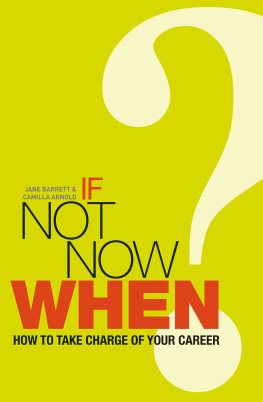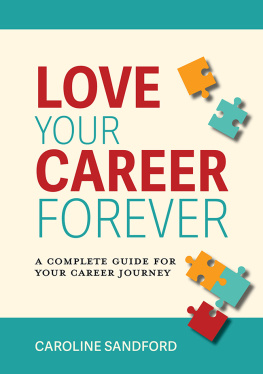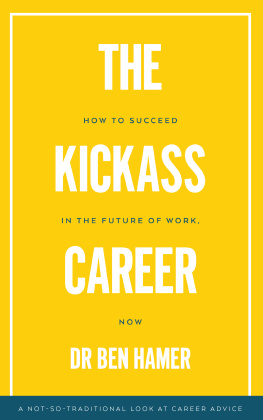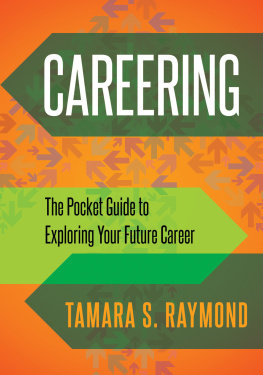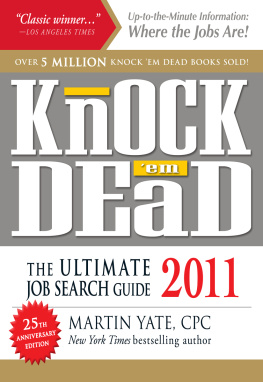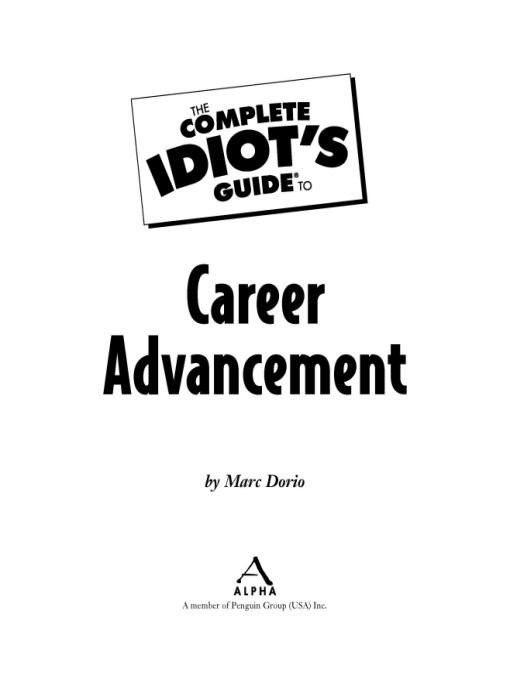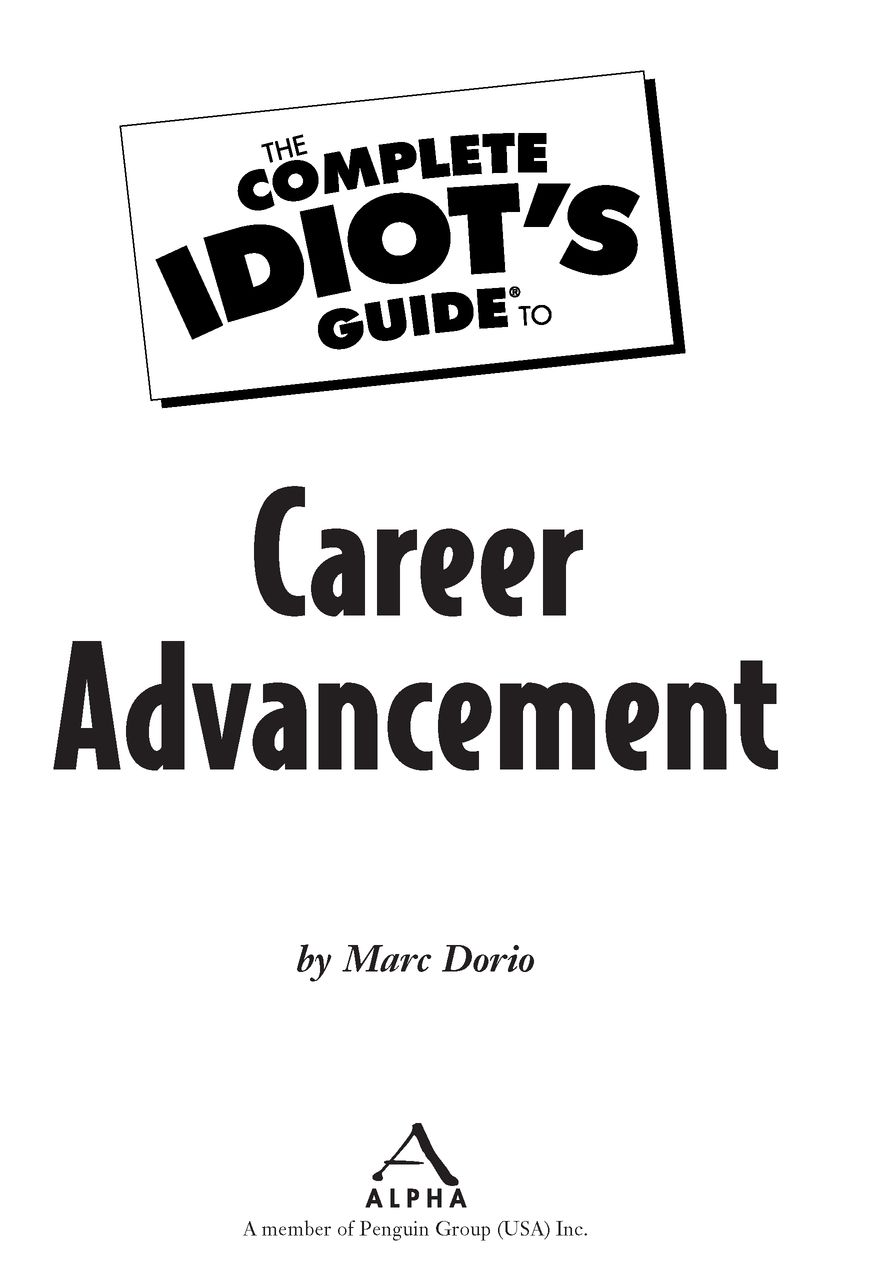Table of Contents
To my beautiful wife, Pat, whose love and support is beyond infinite.
Foreword
If there is any one attribute that is common among us, no matter what job we have, it is that we never learn about the topic of work the way we learn about English, math, history, or even something as mundane as making a bookshelf in woodshop. Take a moment to think about it. Did you have a class on work ethic, how to be a successful employee, or how work and away-from-work life should balance? How about making the decision to look for a job, how to understand your work environment, or plan your work future? Unless you are much different than the vast majority of people I have had the opportunity to work with over my career in human resources, your answer will be, no.
Over the years, in many of the workshops Ive conducted, Ive asked people to take a moment to reflect upon the possible differences between their in-work and away-from-work life, including attitudes, approaches, and general behavior, and time. When they calculate the hours they spend either at work or preparing for work, compared to total number of hours they are awake over the course of a week, they are amazed. Work consumes our time and life. Yet we rarely receive the type of education and ongoing information we need to make the good decisions that guide us through the ins and outs of work, until its too late.
You may have seen the television commercial that depicts a carefree person driving a car who is suddenly the victim of a crash. A resonant voice in the background tells viewers that this is not the time to begin thinking about car insurance coverage. Not unlike career planning, the absolute worst time to think about a career is at the point of impact, when things are bad, and we are least able to sort through the emotions and piles of information about what to do next. The age of the gold watch is over, the labor market is constantly shifting, and our skills to manage through it all are sorely lacking.
For those brave enough to spend time trying to manage certain aspects of their careers, the likelihood is they will search for information using the Internet. Go onto your favorite search engine and insert the phrase, how to manage your career, and be prepared to wade through 1.5 million responses.
In this book, Marc Dorio skillfully translates into words his vast experience coaching and advising people who work at all organizational levels. He logically and thoughtfully lays out both the concepts and techniques needed to gain greater insight and control of your career. The simple rules, wisdom, and self-assessments serve as the basic career planning education we all so desperately need, but rarely receive. This book will undoubtedly become a trusted resource and constant reference guide as you take the first, and ongoing steps to manage your career and that all-consuming part of life we nonchalantly refer to as work.
David L. Waldman
Vice President, Human Resources and Administration
Robert Wood Johnson Foundation
Princeton, NJ
Introduction
Every book is written with a specific point of view; this book is no exception. There are a number of really good books in print about planning and managing a career. Most of them, however, view career planning from the narrow perspective of serial job changes. That is, you reach a point where you know you can and should do better, so you find another job with another company that offers the opportunity you seek and move on.
This approach is pretty much the result of the end of the notion of working for one company for life. However, when this idea was in its prime, companies hadnt begun to diversify very widely as they have more recently. Conglomerates hadnt become what they are today. And the job and career opportunities now offered by many of them didnt exist.
Today, the company you work for could be one of many owned by an enlightened conglomerate. Each may be operated separately, but they all exist to provide value to each other and to the central company. The most progressive of them cooperate willingly with each other to provide you with the advancement opportunities that you used to have to get by quitting one company and moving to another. Today its possible to move to another company and stay within a general corporate framework. It took a while before many companies recognized this, but when they looked at the cost of replacing good talent, it finally struck home. A whack on the side of the head often provides the insight unavailable from even the brightest managers.
This means that moving up doesnt necessarily mean moving out. Now, there are other options to consider. You can often transfer to another company or division within the conglomerate family where the opportunity you want exists. You can get the next-rung job or you can move to a company where your career aspirations may not be blocked as they might be at present. In other words, you have far more opportunities to enhance your career directly or indirectly by moving over to another family company where your path may not be blocked.
Needless to say, if a move up or a move over isnt possible, you can still move out to a different company. I have written this book from the perspective of these three paths: up, over, or out. The suggestions and plans I include are appropriate whichever alternative you choose. Its the broadening of perspective that makes this book different from all the others.
This is not a job-search book, although a lot of what is included will definitely help you in your job search. There are excellent books on job-search methods and techniquesthey pick up where this book leaves off. This book will help you lay the groundwork and create your plan. Once you have read it and understand the concepts, you will be in a far better position to begin your actual search.
I want to stress up front that I am not giving you a rigid career plan to follow. I am giving you all the tools you need and that guidance to use them. Your career plan will never be the same as someone elses, even someone in your field. This book, then, is about career tactics and strategies.
From your perspective, a strategy is your big picture. To use a term currently in vogue, your strategy should result in your personal brand, the picture you want your present employer to see if you are looking to move up or over, or for another employer to see when considering you for possible employment. Its not enough to just do great things, you have to let others know what you have done and what you can do. Theres a really a fine line here between a respected personal brand and being an overbearing braggart. I address this issue throughout the book.
Tactics are the specific activities you perform in service of your strategy. If your strategy is to gain a reputation as the marketing manager companies might want to hire, a typical tactic might be to write articles for the magazines prospective employers might read. I discuss tactics in detail throughout the book, so I wont belabor the point here.
This book is organized serially. If you are starting from scratch, begin with Chapter 1 and read each chapter in turn and your plan should unfold as you go along. On the other hand, if you already have a career plan and it has been less valuable than you thought it might, just dip into the chapters that you feel will help you fill in the blanks.


